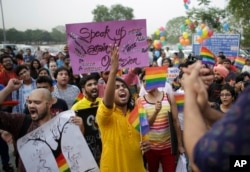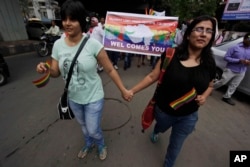At a busy New Delhi intersection, Kummi knocks on car windows and begs for money — the only job she says she is qualified for in India, where stigma denies transgender women like her education and employment.
Male-to-female transgender people, also known as hijras, often beg, sell their bodies for sex, or extract money from families celebrating the birth of a child or a marriage by threatening to curse them with infertility or bad luck.
"I never went to school or college. I have no skills to do much else ... this job gets me by," said Kummi, who goes by one name, and makes about 5,000 rupees ($70) a week, having never attended school after running away from an abusive home.
"When I was younger, I wanted to be a teacher sometimes, sometimes a nurse, sometimes a tailor. But maybe in another life," she told the Thomson Reuters Foundation, wearing a sari, makeup and jewelery.
Her story of exclusion from everyday opportunities is common across conservative India, where homosexuality and even heterosexual sex outside marriage are largely frowned upon.
While many businesses around the world are starting to recognize the benefits of including lesbian, gay, bisexual and transgender people, most countries do not provide any legal protection against workplace discrimination.
In a 2016 survey of 100 Indian LGBT employees, the Mission for Indian Gay and Lesbian Empowerment (MINGLE), an advocacy group, found that 40 percent had been harassed at work and the majority were not covered by LGBT workplace protection policies.
The World Bank estimates that homophobia costs India $31 billion a year in lower educational achievement, loss of labor productivity and the added costs of providing health care to LGBT people who are poor, stressed, suicidal or HIV-positive.
Mayank Bhardwaj, 29, a software engineer, is one of a growing number of open-minded young Indians working to create more inclusive workplaces. His Kinner Jobs website, which will go live in September, aims to help transgender and intersex people develop their skills and find work, particularly in the service sector, where formal qualifications are rarely required.
"I want to change the negative mindset of society so that they can be integrated into the mainstream," said Bhardwaj, who hopes to widen his platform to include blind job seekers and then possibly lesbian, gay and bisexual people.
Employers' fears
Confusion about the law in India has made many employers fearful of hiring LGBT candidates, experts say, because they believe being LGBT is a crime, not just a sexual identity.
India's Supreme Court reinstated a ban on gay sex in 2013, following a four-year period of decriminalization that had allowed a nascent gay culture to come into the open.
"Trans women and effeminate men are harassed most because ours is a very patriarchal society," said Suresh Ramdas, who heads the LGBT support group for Hewlett-Packard, the world's largest personal computer maker, in India. "For a transgender person, it becomes a lot more difficult because they are visibly different. They cannot put their appearance behind them."
Despite a landmark 2014 judgment legally recognizing transgender people and making them eligible for quotas in jobs and schools, they are still regularly thrown out of their homes by their families and denied education and jobs.
As hijras have played a role in Indian society for hundreds of years, campaigners say today's discrimination is rooted in British colonial morality, with a 19th-century penal code prohibiting "carnal intercourse against the order of nature."
Shubha Chacko, executive director of Solidarity Foundation, which helps transgender people find jobs, said workplace bullying is widespread.
"It can be a range of harassment — from sniggers, homophobic, transphobic jokes to the extreme of violence and sexual abuse," she said.
While some LGBT employees have come out at work and received same-sex partnership benefits, the majority stay quiet, often because they are scared of being fired, MINGLE's survey found.
This secrecy can lower their productivity, self-esteem and "ability to live a life of dignity", said Ishaan Sethi, 27, co-founder of Delta, India's first LGBT networking app.
He called for more LGBT-friendly policies such as gender neutral bathrooms, insurance for same-sex couples, leave for sex reassignment surgeries and sensitization of employees to make workplaces more inclusive.
"The end goal of assimilation is when your sexuality or your gender identity is not even a topic of discussion," he said.







